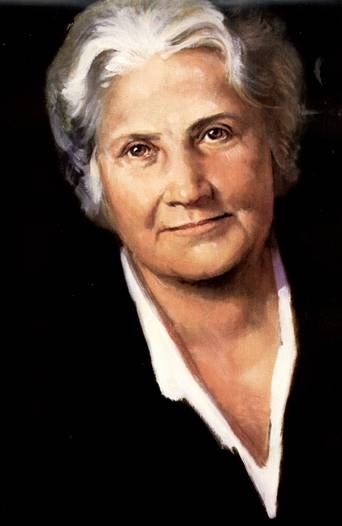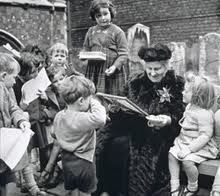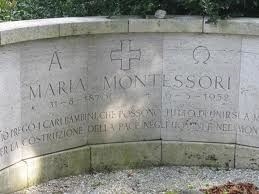 |
| Maria Montessori (geelongmontessori.com) |
Some say "Those who can, do; and those who can't, teach." (H.L. Mencken). Maria Montessori however did prove this statement true. Montessori, who was born on August 31, 1870 in Chiaravalle, Italy was a teacher who could “do”. At that time, it was rare for a woman to want any sort of profession. However, Montessori was different from most girls of her time. Her mother, who was also well educated for her time and place, encouraged more extensive education for her daughter. When Montessori was twelve years old her family moved to Rome, where she could receive a better education. Montessori originally pursued a medical career and in fact, received her degree in that field, becoming the first woman to receive a medical degree in Italy. During one of her medical assignments, she realized she had a passion for teaching. Montessori’s perseverance and caring personality allowed her to pursue her vision to make the world a better place by helping children all around the world.
 |
| Montessori working with children (www.montessorica.com/Maria_Montessori) |
Montessori showed compassion in everything she did. She loved teaching and helping children. Most people of her time believed that if a child was different then that child was not teachable, but Montessori believed otherwise. She believed that “each child is born with a unique potential to be revealed, rather than as a "blank slate" waiting to be written upon.” (MARIA MONTESSORI, MD The International Montessori Index). Montessori believed that all children were equally intelligent, but they all had individual strengths. Her goal was to help them be the best they could be. She believed that all children learned in different ways and they need to learn certain things at different times. Montessori was interested in all children, not just the ones that seemed to be smart. “During the late 1890s she worked in Rome at institutions for the mentally disabled. During her work with the disabled she became interested in how children learn and respond to their environments.” ("Maria Montessori." World Eras. Ed. James R. Farr. Vol. 9). She continued to work with the mentally disabled even when others wouldn’t because they believed it was a waste of time to try to educate those children. However, Montessori believed all children should have the opportunity to have an education. Montessori showed much compassion when helping the children. She believed in them and wanted to help them succeed.
Despite her natural teaching ability, Montessori would never have received such respect unless she persevered and stood up for what she believed in. Montessori dreamed of having a professional career. However, her father had different ideas. "Her father, a tradition-bound army officer, discouraged her interest in a professional career; however, with the encouragement and support of her mother, she prepared herself for her later career." ("Maria Montessori." Encyclopedia of World Biography). Her father, Alessandro, believed it to be improper for women to work, and was greatly opposed to it. Undeterred by her father’s doubts, Montessori knew that her purpose was to touch the lives of others, so she pursued a professional career. Her mother supported her decision and helped her achieve it in any way possible. Montessori knew what she wanted and didn't care what others thought about her. Focusing on the belief that all should have an education, she wanted to make sure that others could benefit from the teaching methods she developed. "Montessori gave up all professional appointments to focus on the widening international network of schools and societies, the training of teachers, and the production and sale of instructional materials." ("Montessori, Maria." Europe 1789-1914: Encyclopedia of the Age of Industry and Empire. Ed. John Merriman and Jay Winter.Vol. 3). After spending much time observing children she created the “Montessori Method.” Using her personal method of teaching, she helped many children receive a successful education. Montessori worked to help others. The only reward she wanted was to see children succeed and to help other children benefit. Although most people didn't believe in Montessori, she persevered and did what she set out do.
 |
| Grave Stone (upload.wikimedia.org/wikipedia) |
Maria Montessori once said; "If education is always to be conceived along the same antiquated lines of a mere transmission of knowledge, there is little to be hoped from it in the bettering of man's future. For what is the use of transmitting knowledge if the individual's total development lags behind?" (Maria Montessori). Montessori encourages everyone to believe in themselves and to never give up even when the goal seems unrealistic. She encourages people that a little kindness goes a long way. Montessori had many obstacles to overcome in order to do what was important to her. However, she was able to overcome all of these obstacles because her goal was clear and meaningful to her. Not all people have the self-confidence to be able to do what Montessori did. Remember to ask yourself: “What do I want? Am I doing this for myself or for someone else?” (Unknown). Nobody ever believed in Montessori. They all thought she was crazy for wanting to do anything except cook, clean, and have babies. She is an inspiration to me because she always had a goal and she was willing to work for it. To me a true hero is someone who has a compassionate vision to make the world a better place and who has the perseverance to withstand criticism while working toward that vision.
"Maria Montessori." Encyclopedia of World Biography. Detroit: Gale, 1998. Gale Student Resources In Context. Web. 14 Dec. 2010.
MARIA MONTESSORI, MD The International Montessori Index was last updated on December 13, 2010 http://www.montessori.edu/maria.html
"Maria Montessori." U*X*L Biographies. Detroit: U*X*L, 2003. Gale Student Resources In Context. Web. 15 Dec. 2010.
"Maria Montessori." World Eras. Ed. James R. Farr. Vol. 9: Industrial Revolution in Europe, 1750-1914. Detroit: Gale, 2003. 278. Gale Virtual Reference Library. Web. 15 Dec. 2010.
MILLER, PAVLA. "Montessori, Maria." Europe 1789-1914: Encyclopedia of the Age of Industry and Empire. Ed. John Merriman and Jay Winter. Vol. 3. Detroit: Charles Scribner's Sons, 2006. 1542-1543. Gale Virtual Reference Library. Web. 15 Dec. 2010.
"Montessori, Maria (1870–1952)." Dictionary of Women Worldwide: 25,000 Women Through the Ages. Ed. Anne Commire and Deborah Klezmer. Vol. 2. Detroit: Yorkin Publications, 2007. 1349. Gale Virtual Reference Library. Web. 15 Dec. 2010.
"Montessori, Maria." International Encyclopedia of the Social Sciences. Ed. David L. Sills. Vol. 10. New York: Macmillan, 1968. 476-478. Gale Virtual Reference Library. Web. 14 Dec. 2010.
Page created on 1/21/2011 12:00:00 AM
Last edited 1/21/2011 12:00:00 AM
